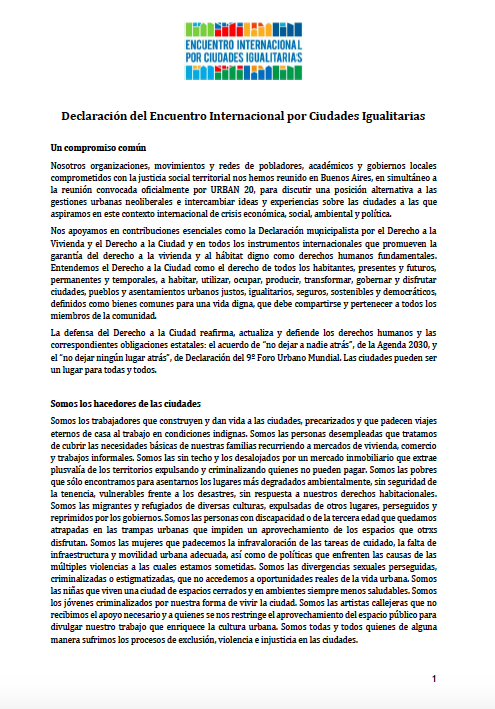Twenty years after Habitat I (Vancouver), the world’s human settlements continue to deteriorate. The scale of the problem is immense, and the challenges multi-dimensional. Close to 1.2 billion people, almost one-quarter of the world’s population, live in desperate housing and settlement conditions that are unsafe, unhealthy and precarious, including more than 100 million who are homeless. While the majority of the inadequately housed live in poor countries, their numbers are growing in wealthy countries.
Also growing are the numbers of those displaced, evicted, or forced by political, ethnic, technocratic, religious, and economic reasons to leave their environments, their homes, their communities and even their countries of origin. Many people are suffering the violent destruction of their homes and neighbourhoods.
Structural adjustment programs have led to the erosion of wages, growing unemployment, the reduction or cancellation of subsidies, and greater social inequality among other conditions which further deteriorate the quality of life and the ability of families to obtain a home. These impacts weigh most heavily on women and other already vulnerable sectors. While adjustment policies are promoted in order to strengthen the role of the market, the increased poverty that results from such policies leads to a greater percentage of families marginalized from the market economy. The market has never solved nor will ever solve the housing needs of the great majority of the world’s population.
In order for the Habitat II Conference to obtain its goals of adequate shelter and a sustainable future for all, the focus of the Conference must be the improvement of the quality of life in the world’s rural and urban settlements. The Habitat n Conference will only be successful if it fully recognizes and embraces the fact that the people themselves, acting individually or collectively, have always been and will continue to be the main actors in producing and giving life to housing and human settlements.
Habitat II must establish concrete measures to recognize, enable, support and protect people’s efforts to continually improve their living conditions in accordance with their culture and in harmony with nature. The following are the main challenges to be faced by the world’s governments:
Recognition and Implementation of the Human Right to Housing
The human right to adequate housing is the right of every child, woman and man to gain and sustain a secure home and community in which to live in peace and dignity. Human beings, as all species, have a right to a habitat on earth. A place to live is as basic a human need as food or clothing. The lack of any of these, or precarious conditions in their satisfaction, deprive human beings of a life in peace and dignity.
Physical and psychological health, and even life itself, depend on the possibility of individuals and families to use and enjoy a secure place to live. The expression of a basic need is a claim be treated as a human being, and human rights and human needs are therefore linked as breath to life
The full recognition of human rights and sub sequent government and civil society obligations are the foundation of a democratic society and serve as a basis for citizenship
Human settlements are the place in which the fulfillment of all human rights converge The full realization of the right to housing implies equal access for all to land; to the means of subsistence; to a safe and secure environment; to housing, water, sanitation, health services, food, public transportation, education, work, rest and recreation, information and infrastructure. Minorities should be respected, as should ethnic, sexual and cultural plurality
The adoption of international human rights instruments is a fundamental step in the implementation of the right to housing. National strategies for implementing international human rights obligations should be developed and adopted by governments in collaboration with NGOs and civil society.
An Active Role of the Decentralized State in the Fulfillment of The Right to Housing
The decentralization of the State must be accompanied by the recognition and full assumption of its fundamental obligations and responsibilities. While we recognize that the solution to the serious world housing and human settlements problems is the task and responsibility of all, we are convinced that those primarily responsible for establishing and guaranteeing the necessary conditions are the governments.
Decentralization of the State does not mean that States are to be relieved of their historic social responsibilities. On the contrary. States can now dedicate themselves to what we consider to be their fundamental roles: to achieve equal opportunity for all by fulfilling their redistributive obligation; by guaranteeing the fulfillment and enrichment of social rights; by ensuring that no one violate the rights of others in the process of fulfilling their own rights; by summoning and promoting the mutual empowerment of different social actors, and by strengthening and giving priority to the weakest.
Decentralization does not imply the abandonment by States of their fundamental obligations to recognize, support, protect and defend the fulfillment of the right to housing. States have the obligation to ensure that the right to housing not be violated. This includes the enforcement of the legal right to security of tenure and protection from forced eviction and the destruction of one’s home among other specific obligations.
Democratic Governance as a Central Condition for Equity and Sustainability to Be Achieved
The right to participation of all women and men in the planning and management of their habitat is indispensable in order to guarantee that the use of the resources and any projects and investments carried out therein benefit them directly, within criteria of equitable distribution, economic complementarily, respect for varying cultures, and ecological sustainability. For this it is necessary to ensure mechanisms and instruments so that priorities are defined through participatory social processes.
Peoples’ organizations and the non-governmental organizations which support them must have institutionalized opportunities to influence at the highest level the design of policies, instruments and programs which involve and affect them and in the various habitat-related administrative agencies and bodies.
Democratic collaboration between the community and the local government is the most effective path towards the achievement of improved living conditions and sustainability.
Recognition and Support for People’s Production of Housing
We demand full recognition and support for people’s production of habitat, which is th housing, work space and urban facility production which takes place at the initiative and under the control of families and organizations for they own use. We reject the idea that peoples’ effort to build the city be considered irregular, sub-normal or informal, since these terms attempt ti discredit and block their own capacities. We demand that the efforts and responsibilities required of the people by decentralization be supported through national, integral systems of legal, financial, administrative, fiscal and promotional support for their particular logic and production and management practices.
People have the freedom and right to organize themselves, to be legally recognized, to mobilize material resources and those resulting from solidarity and mutual support, to obtain technical assistance from whomever they choose, and to seek complementary support in order to confront the lack of housing and social services. People have the right to control their own processes o housing production and improvement. State must eliminate obstacles to and support people’s development and use of alternative appropriate technologies. The housing production efforts o peoples’ organizations such as cooperatives and housing associations must be recognized and supported.
Access to Adequate Financial Resources
All have the right to enjoy adequate housing independent of their resources or income level. Special measures must be made to change resources to the poor who do not have access to the financial mechanisms which are oriented solely towards the market production of housing. Appropriate financial schemes for those in need considering different resource levels and form of production must be developed. Special attention and access to adequate subsidies must be given to vulnerable groups.




